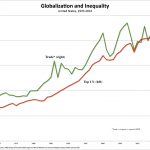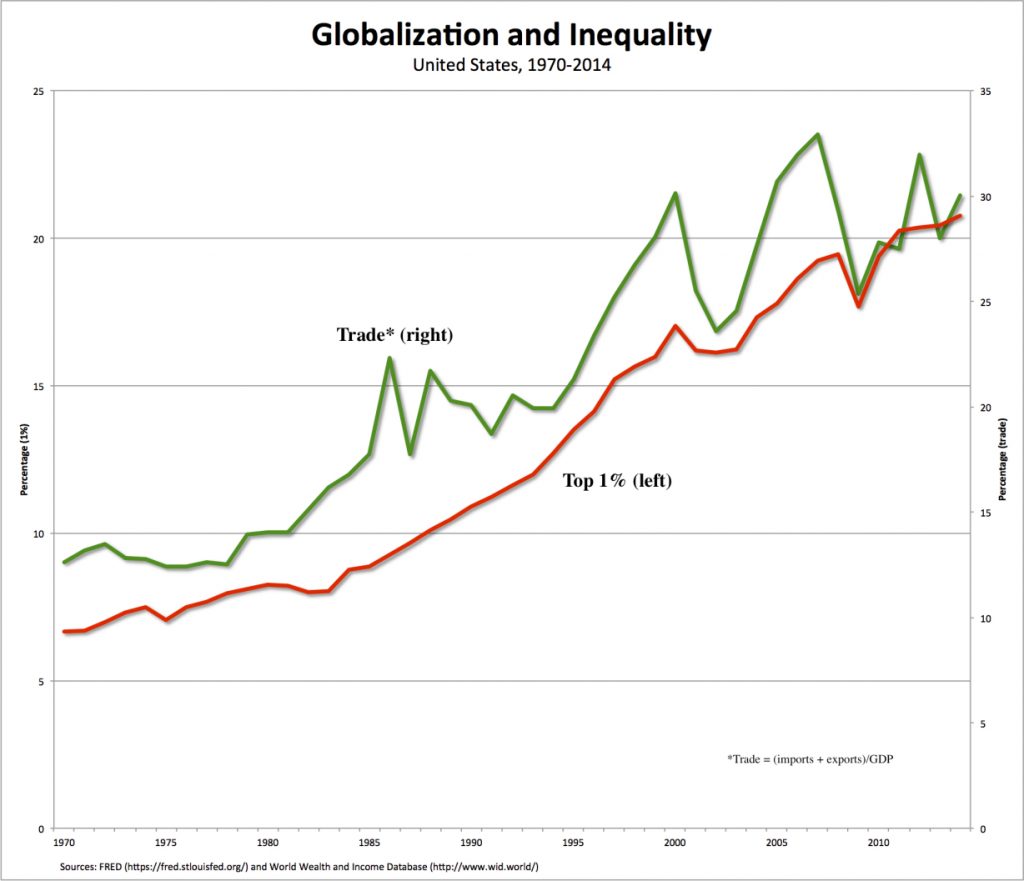Are mainstream economists responsible for electing Donald Trump?
I think they deserve at least part of the blame. So, as it turns out, does Dani Rodrick.
My argument is that, when mainstream economists in the United States embraced and celebrated neoliberalism—both the conservative and “left” versions—they created the conditions for Trump’s victory in the U.S. presidential election. As I see it, mainstream economists adopted neoliberalism as a set of ideas (about self-governing individuals and an economic system that needs to be understood and obeyed) and a political-economic project (on behalf of corporate bosses) and ignored the enormous costs, especially those borne by the majority of workers, their families, and the communities in which they live. And it was precisely the resentments generated by neoliberalism—which were captured, however imperfectly and in a cynical manner, by Trump’s campaign (and downplayed by Hillary Clinton’s)—that many voters took to the polls one week ago.
Get Evonomics in your inbox
Rodrick’s condemnation of mainstream economists is more specific: the role that mainstream economists served as “cheerleaders” for capitalist globalization.*
It has long been an unspoken rule of public engagement for economists that they should champion trade and not dwell too much on the fine print. This has produced a curious situation. The standard models of trade with which economists work typically yield sharp distributional effects: income losses by certain groups of producers or worker categories are the flip side of the “gains from trade.” And economists have long known that market failures – including poorly functioning labor markets, credit market imperfections, knowledge or environmental externalities, and monopolies – can interfere with reaping those gains.
They have also known that the economic benefits of trade agreements that reach beyond borders to shape domestic regulations – as with the tightening of patent rules or the harmonization of health and safety requirements – are fundamentally ambiguous.
Nonetheless, economists can be counted on to parrot the wonders of comparative advantage and free trade whenever trade agreements come up. They have consistently minimized distributional concerns, even though it is now clear that the distributional impact of, say, the North American Free Trade Agreement or China’s entry into the World Trade Organization were significant for the most directly affected communities in the United States. They have overstated the magnitude of aggregate gains from trade deals, though such gains have been relatively small since at least the 1990s. They have endorsed the propaganda portraying today’s trade deals as “free trade agreements,” even though Adam Smith and David Ricardo would turn over in their graves if they read the Trans-Pacific Partnership.
This reluctance to be honest about trade has cost economists their credibility with the public. Worse still, it has fed their opponents’ narrative. Economists’ failure to provide the full picture on trade, with all of the necessary distinctions and caveats, has made it easier to tar trade, often wrongly, with all sorts of ill effects.
Rodrick is absolutely right: mainstream economists’ own models include at least some of the losses from trade—in terms of outsourced jobs, declining wages, and rising inequality—but, in their textbooks and public interventions, they routinely ignore those losses and take the position that globalization and free trade need to be celebrated, protected, and expanded. Lest they create an opening for the “barbarians” who are critical of the conditions and consequences of capitalist globalization.
Those of us who have been critical of free-trade agreements and the whole panoply of policies associated with globalization and neoliberalism understand they’re not the sole or even main cause for the deteriorating condition the U.S. working-class has found itself in recent years and decades. Neoliberalism is not just globalization, as it includes a wide range of strategies and structural changes that have boosted the bargaining power of employers vis-à-vis workers—from the adoption of labor-saving technologies through the growth of the financial sector to a deterioration of the social safety net.
But we also can’t ignore the correlation, since the early-1970s, between globalization (measured, in the chart above, by the sum of exports and imports as a percentage of GDP, which is the green line on the right-hand axis) and inequality (measured, in the same chart, by the percentage of income, including capital gains, going to the top 1 percent, on the left-hand axis). There are lots of economists, both everyday and academic, who understand that a tiny group at the top has captured most of the benefits of trade agreements and other measures that have allowed U.S. corporations to engage in increased international trade, both importing and exporting commodities that have boosted their bottom-line. Meanwhile, many American workers—many of them voters in Pennsylvania, Ohio, Michigan, and Wisconsin—have lost jobs, received stagnating wages, and suffered as their local communities deteriorated.
However, mainstream economists, in their zeal to push globalization forward, ignored those problems and concerns. They thus paved the way and deserve a large share of the blame for Trump’s victory.
*Readers need to keep in mind that, when Rodrick refers to economists, he’s actually referring only to mainstream economists (which is the only group he seems to recognize). Other, so-called heterodox economists have never been so sanguine about the effects of neoliberalism or capitalist globalization.
Originally published here.
2016 November 20
Donating = Changing Economics. And Changing the World.
Evonomics is free, it’s a labor of love, and it's an expense. We spend hundreds of hours and lots of dollars each month creating, curating, and promoting content that drives the next evolution of economics. If you're like us — if you think there’s a key leverage point here for making the world a better place — please consider donating. We’ll use your donation to deliver even more game-changing content, and to spread the word about that content to influential thinkers far and wide.
MONTHLY DONATION
$3 / month
$7 / month
$10 / month
$25 / month
You can also become a one-time patron with a single donation in any amount.
If you liked this article, you'll also like these other Evonomics articles...
BE INVOLVED
We welcome you to take part in the next evolution of economics. Sign up now to be kept in the loop!


























